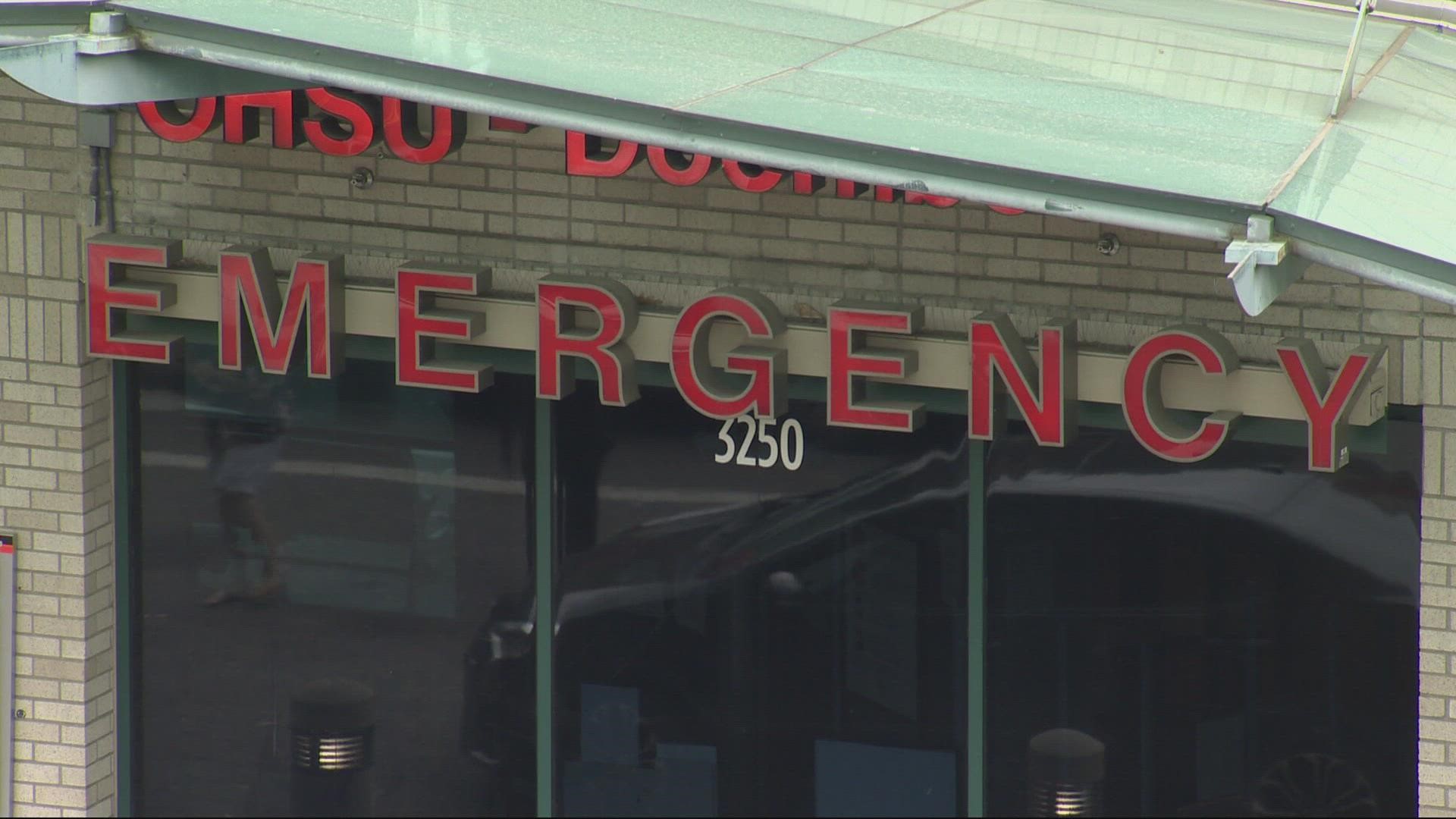PORTLAND, Ore. — Oregon's COVID-19 hospitalizations are surging, with the number of patients jumping by nearly 90 in one day.
On Tuesday, there were 838 people with COVID being treated in Oregon hospitals; 222 of them were in intensive care units (ICUs).
The situation is dire in Central Oregon, where the latest Oregon Health Authority data shows there are no staffed adult ICU beds available. In Southern Oregon, there's only one.
The problem is now impacting emergency rooms (ERs). In the Portland metro area, ERs are already slammed during normal, non-pandemic years. Right now, they're especially backed up.
Emergency rooms across both Oregon Health & Science University (OHSU) and Legacy Health are very full; OHSU said it's operating 10% above normal capacity.
"It is particularly challenging because we've seen a return of normal high complexity, high acuity care that we manage every day in the ER. And on top of that, we're seeing the current surge in the COVID-19 delta variant," Dr. Dan Bissell, with Legacy Health Emergency Services, said.
Worst-case pandemic scenarios we tried avoiding are now coming true.
Coronavirus cases are surging and hospital beds are filling up, impacting the entire health care system. All types of patients wait hours or days to get admitted to the hospital.
The backup is pouring over into emergency rooms, which are having to serve as in-patient units.
At the main OHSU campus, patients who get admitted but are waiting for a hospital room currently take up half of its 32 ER beds.
"What that means is there's fewer emergency medicine beds to take care of patients that need acute care," Dr. Mary Tanski, OHSU Emergency Medicine chair, said.
On top of more unvaccinated COVID-19 patients in hospitals, people who waited to get care during the pandemic are coming in sicker with more complications. Dr. Bissell noted the percentage of people coming in with COVID symptoms or active COVID is still less than non-COVID emergency room patients.
"It's compounded by the fact they're staying longer because of their illnesses," Dr. Tanski said. "And many can't be discharged safely to things like skilled nursing facilities or other places, especially those who have COVID or are getting over COVID, because they still need to isolate and make sure other people are protected."
If people's problems aren't as pressing, they get triaged quickly but could wait hours for care in the ER.
Metro area emergency department heads said they're seeing a huge strain on the health care system.
"It's a big deal because whether you have COVID or not, even if you have a regular illness or get in a car crash or a broken bone, care is going to be delayed," Dr. Tanski said.
"It breaks our heart because we want to care for people as quickly as we can. We don't want them to wait. We understand it can be frustrating," Dr. Bissell added.
Both Legacy Health and OHSU's emergency rooms set aside areas, like auditoriums, for surge space. They developed these plans and protocols early on in the pandemic and may have to execute them.
Surge plans would allow hospitals to manage patients and move them around as dynamically as possible to ensure they get the right level of care in an appropriate setting.
Bissell said Legacy can shift resources to accommodate patients in its emergency rooms beyond the 180 beds in its facilities.
Staffing those beds is another question. Health care systems are facing a nursing shortage and don't necessarily have the nursing staff to man those beds.
"A lot of us are sort of staring at this new wave of COVID and thinking, 'wow, we're getting ready to gear up and do this again'. So we're sort of in disbelief about that," Dr. Tanski said.
"We feel like we're standing on the lines wanting to care for you and we ask you to do the same and do your part to help us manage this and get past the delta surge and get life back to normal," Dr. Bissell added.
Doctors hope this wave wakes people up and pushes them to mask up, physically distance and get vaccinated in order to flatten the curve again.
They're also asking the public to limit risky activities that could send people to the ER or hospital, check in with primary care doctors more often and go to urgent care if they don't need emergency-level care.
If you do have to go to the ER, doctors ask you to be patient because they're doing the best they can.

